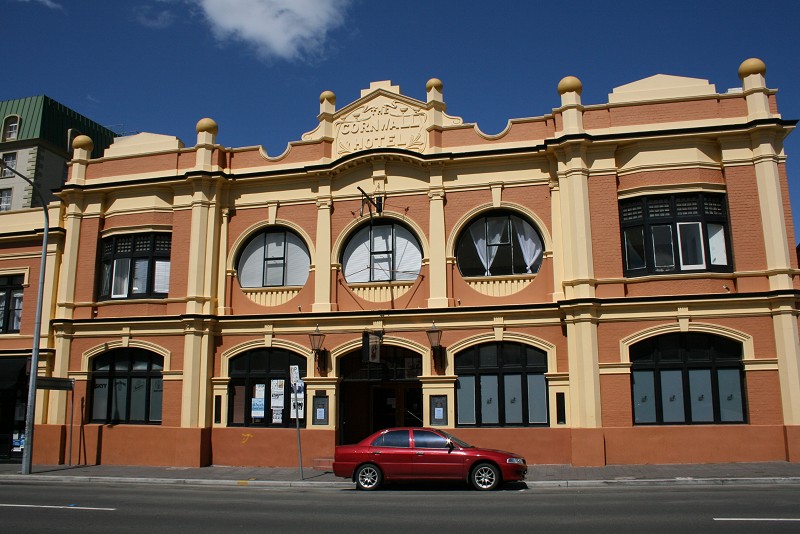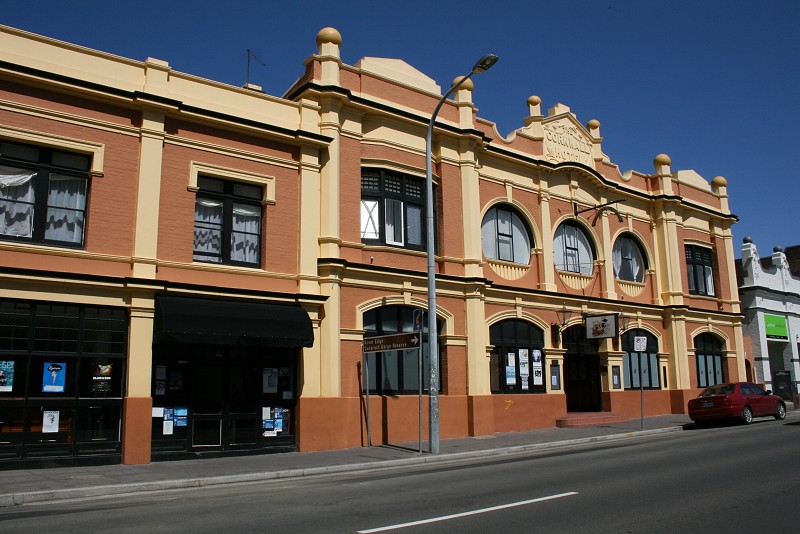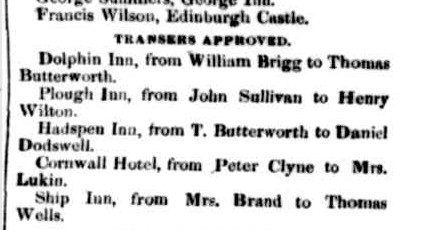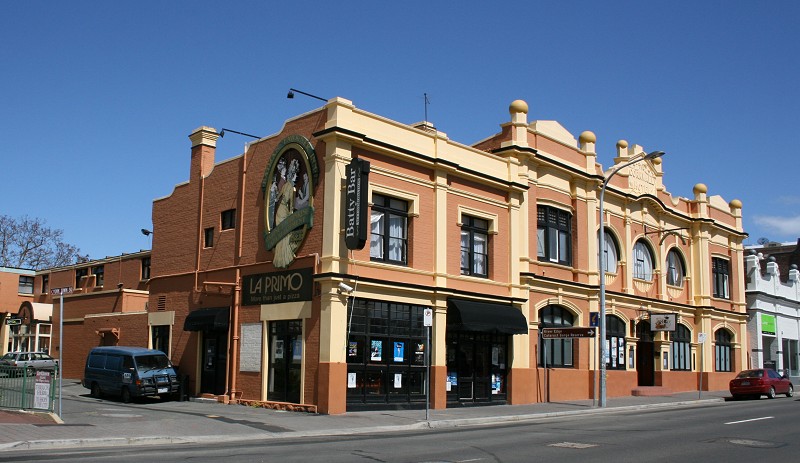Cameron Street. Google Maps.
Originally constructed 1824 by John Fawkner, who was refused a licence at first (see below).
Licensed 1826.
Current building retains very little of the fabric of the original building.
Companion to Tasmanian History entry
From a lecture by Mr E. Whitfield. 1897:
About 1825 the Cornwall came into existence, and was kept by Mr. J. P. Fawkner, famous as having been one of the founders of Melbourne. He was a most useful man in the community. He was baker, butcher, general storekeeper, and sawyer. He instituted a circulating library, gave lessons in French, was lawyer, and pleaded for people at the Court of Requests; was also editor and proprietor of a paper, the “Launceston Advertiser;” added to this he was market gardener and coach proprietor.
Launceston Examiner, 6 February 1897
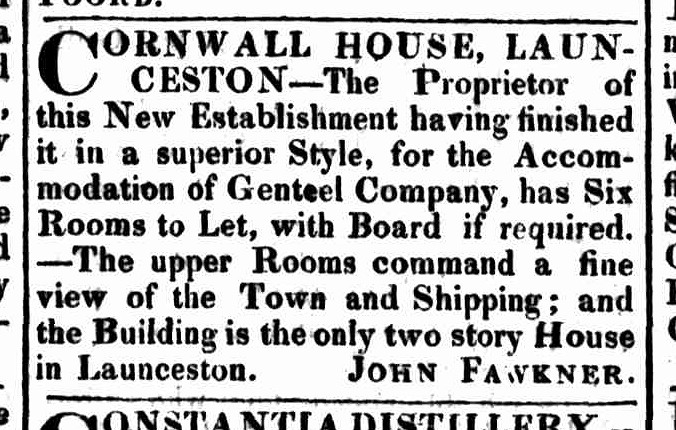
Hobart Town Gazette, 24 September 1824
To His Honor George Arthur Esquire Lieutenant Governor of Van Diemen’s Land
The Humble Memorial of John Fawkner
Most respectfully Sheweth
That your Memorialist arrived in the Colony free and has been a number of years resident therein. That he some time ago built a large and commodious two story house containing six large Front rooms and four back rooms and more recently a Stable containing Eight Stalls in Cameron Street Launceston.
That the said Premises being more extensive than your Memorialist [?] required for himself and Wife he accordingly applied to the Commandant of Port Dalrymple and the Magistrates of the County for their Sanction to an applications he intended making to the Worshipful Bench of Magistrates for a Licence to retail Wines and Spirits and obtained their Sanction but on such application for a Licence being made to the Bench by your Memorialist the same was rejected on grounds and for reason unknown to your Memorialist.
That the only Licensed house in Launceston where attention is paid to the [?] of the Inmates[?] is the Launceston Hotel but it was not infrequently [?] in consequence of the great influx of strangers [?] Town they have been compelled to seek refreshments and lodging in a less reputable house.
That your Memorialist has expended the greater part of his capital in erecting and furnishing his house and premises for the purpose of obtaining a Licence and for the accommodation of Travellers and others and having been most repeatedly urged by many of the most respected Inhabitants (more particularly the mercantile) to endeavour to obtain such Licence for their accommodation your Memorialist therefore most respectfully begs that your Honor will be pleased to recommended him to the Magistracy of the County oaf Cornwall as a fit and proper person to hold a Licence to retail Wine Spirits and Beer and also legs to refer your Honor to His Majesty’s Attorney General J.T. Gellibrand Esquire who has a knowledge of the house and premises having lodged with your Memorialist.
And your Memorialist is duty bound will ever pray.
Cornwall House
Launceston February 1825[?]
It was the Commandant who refused me the Licence as [names] all assured[?] me that they had no objection After the Commandant Refused me
John Falkner
(Transcribed from QVMAG Manuscript 466/5, being a copy made of a “Tasmanian State Archives” document in 1954, which is why it is hard to read in places.)
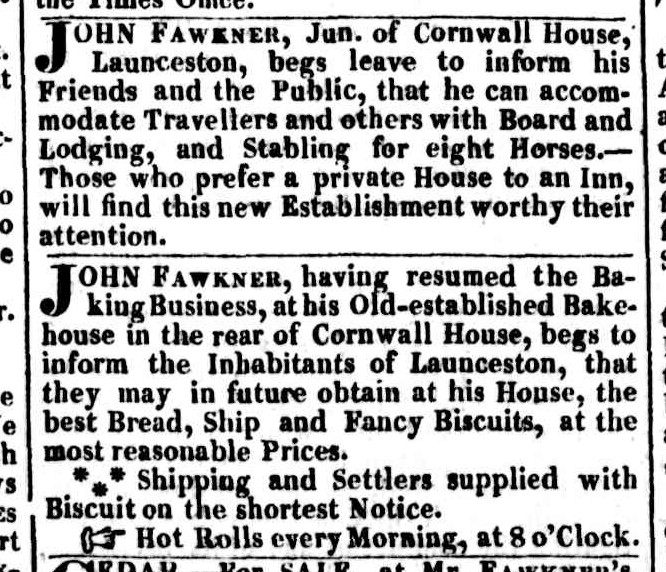
Colonial Times, 23 September 1825
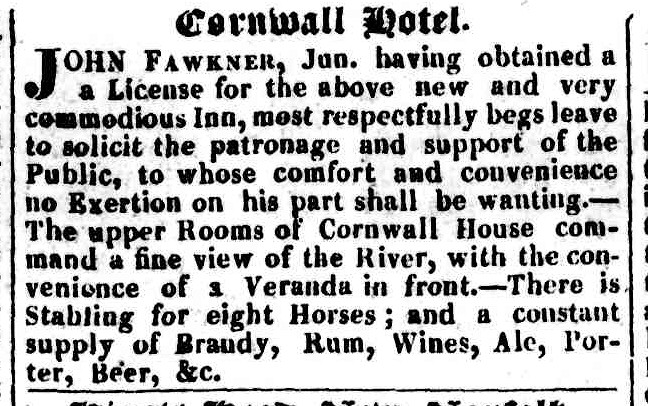
Hobart Town Courier, 13 October 1826
On Wednesday last our worthy Magistrates, Messrs. Kenworthy, Gordon, and Simpson, went round to inspect the various public houses, and also those houses for which applications had been made to be allowed to retail spirituous liquors. At Alexander Stewart’s they found only one bed, that in which he and his wife sleep, the house is an old one, with two small front rooms, and one back room, there was not one single chair, and scarcely a table in this house, yet it was relicensed but he bows very obsequiously. They also visited a house formerly kept by Mr. Thomas Manning, which house was refused a license last year, and Mr. T. C. Simpson was on the bench. This house has had no additional accommodation added to it, and yet a license was granted to it, it is an old house, contains three very small front rooms, and a back skilling, and was pronounced by P. A. Mulgrave, Esq. and Mr. Simpson a year back as not possessing sufficient accommodations. Several of the licensed houses were deficient both in stabling and beds, and there are three or four houses, each of which would stand in one room at the Cornwall Hotel, and yet, strange to say, the proprietor of that extensive establishment, which has cost in building and furniture upwards of £2,500, was refused a renewal of his license. The house contains 13 rooms, with accommodations for 10 persons to lodge and board, together with a seven-stall stable. We also inform the Public, that some of the highest Officers in the Colony, both Civil and Military, have lodged and boarded at this Hotel, and have expressed their satisfaction of the accommodations; amongst others, the two Attorney General, Gellibrand and Hone, Esqrs., the Solicitor Generals, Alfred Stephen, Esq., Mr. Butler, Doctors Cameron and Pearson, and various others, to whom the proprietor can publicly appeal, also, P. A. Mulgrave Esq. did occasionally dine at this Hotel, up to his departure. We have only to add, that the proprietor has been but once fined during the three years he had a license, while several of those who are now licensed have been very repeatedly fined. It is only owing to independence of spirit, we know who has been working the puppet wire, the ______ , who lives at the ___ has been offended, and it was spoken of by one of that ___ a month back, that Fawkner should lose his license. We further add, that a subscription is about to be opened to defray the expense of bringing this question before the Supreme Court, on this public ground, to determine whether the Magistrates are to be allowed to ruin a man who has embarked his all in an hotel, for the use of the Public without assigning any reason, and with out the party having been guilty of a breach of the regulations. The very furniture of the Cornwall Hotel cost more money than A. Stewart’s house and premises with the furniture, stools, &c. included.
On Saturday Messrs. Gordon, Kenworthy, and Simpson met at the court house to grant licenses for the ensuing year. Mr. Gordon left early to proceed to George town to hold an inquest upon a Constable who had been shot while on duty at the female factory at that place, from which a woman named Sullivan made her escape the same night. Messrs. Kenworthy and Simpson then licensed 10 of the former Publicans, and also granted licenses to four new applicants, and refused to re-license John Fawkner, Junr. Mr. Geo. Burgess, and Mr. J. H. Jackson, and upon being applied to by them for time to dispose of their stock, Mr. Simpson said no time could be granted, although one or two have large stocks on hand. Why did the Magistrates visit these houses with out finding any fault with their accommodations, when they had determined not to license them, but to license others with most obviously inferior accommodations?
Launceston Advertiser, 28 September 1829
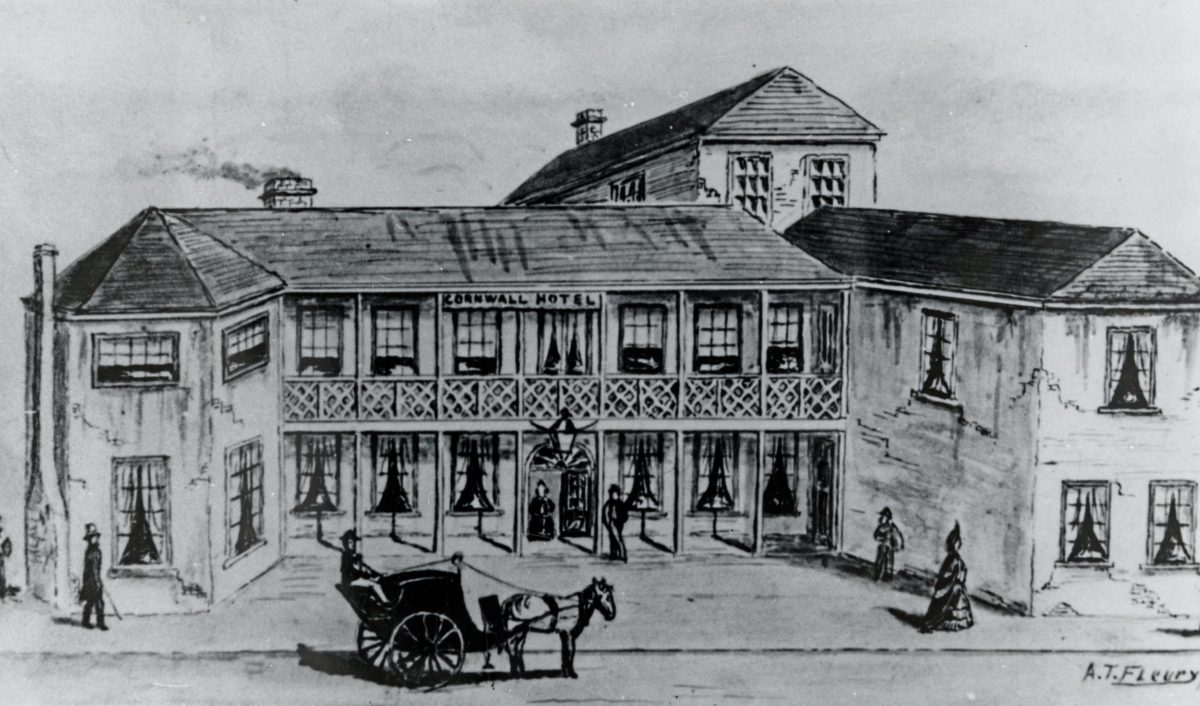
“Photograph – Cornwall Hotel, Launceston – (AT Fleury sketch)”, from the Tasmanian Archives & Heritage Office.
PUBLICANS’ LICENSES — A Bench of Magistrates assembled in sessions at the Court House, on Monday last, to consider applications for fresh Licenses and Transfers. The Dover Castle was transferred from William Major Grayling to Thomas Archer; the Sir William Wallace Inn, from Britton Jones to Joshua Lyons; the Cornwall Hotel, from Loftus Dickenson to Henry Palmer; the Waterloo Tavern, George Town, from G. Wilson to Jonathan Stammers Rudkin; a new license was granted to Edward Blown, for the Lamb and Flag, York-street, and two applications for houses at Patterson’s Plains were refused, on the grounds of not being required for the public accommodation.
Cornwall Chronicle, 12 February 1842
In 1855, the hotel was taken by Mary Ann Lukin, and then Elijah Panton. At time of this transfer, the contents of the hotel were offered by sale. This is a very long image with the room by room inventory of the hotel contents.
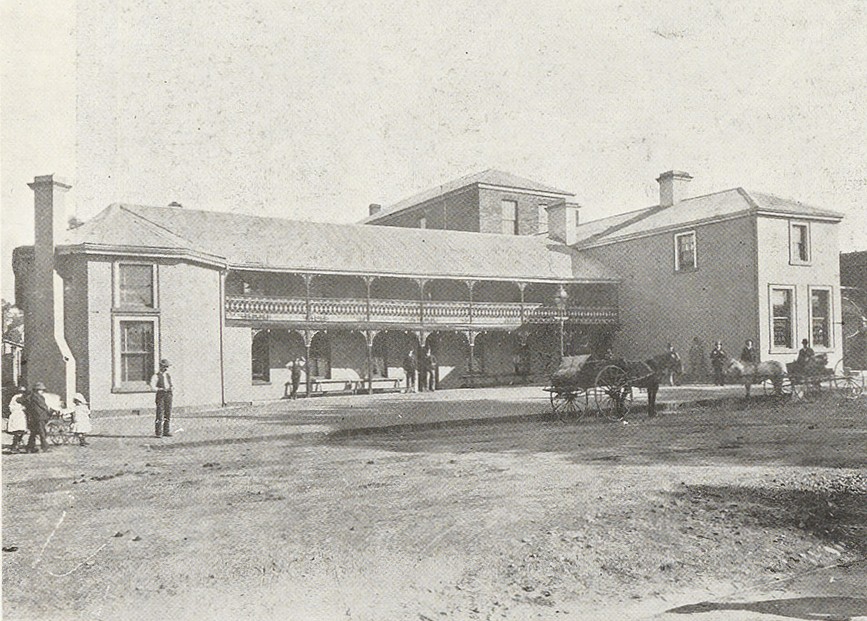
From the Weekly Courier, 25 October 1934. The captain says “The old Cornwall Hotel, Launceston, in 1835″.
The 1865 Annual Licensing Meeting has these lines:
Mr E. E. Panton’s application for a license for the Criterion Hotel was
granted. This leaves the Cornwall Hotel unlicensed and vacant.
In 1870, Michael Cleary licensed a different house, on the corner of Brisbane and Charles St, that was also known as the Cornwall Hotel.
In 1874, the following appeared:
Michael Fahey applied for a license for the old Cornwall Hotel. Mr Coulter said the applicant had been keeping the house as a boarding house.
The Chairman–A boarding house on temperance principles (a laugh).
Mr. Coulter–Yes, Sir. It will be a suitable house for travellers.
Chairman-I hope not on intemperance principles.
No objection being raised the licence was granted.
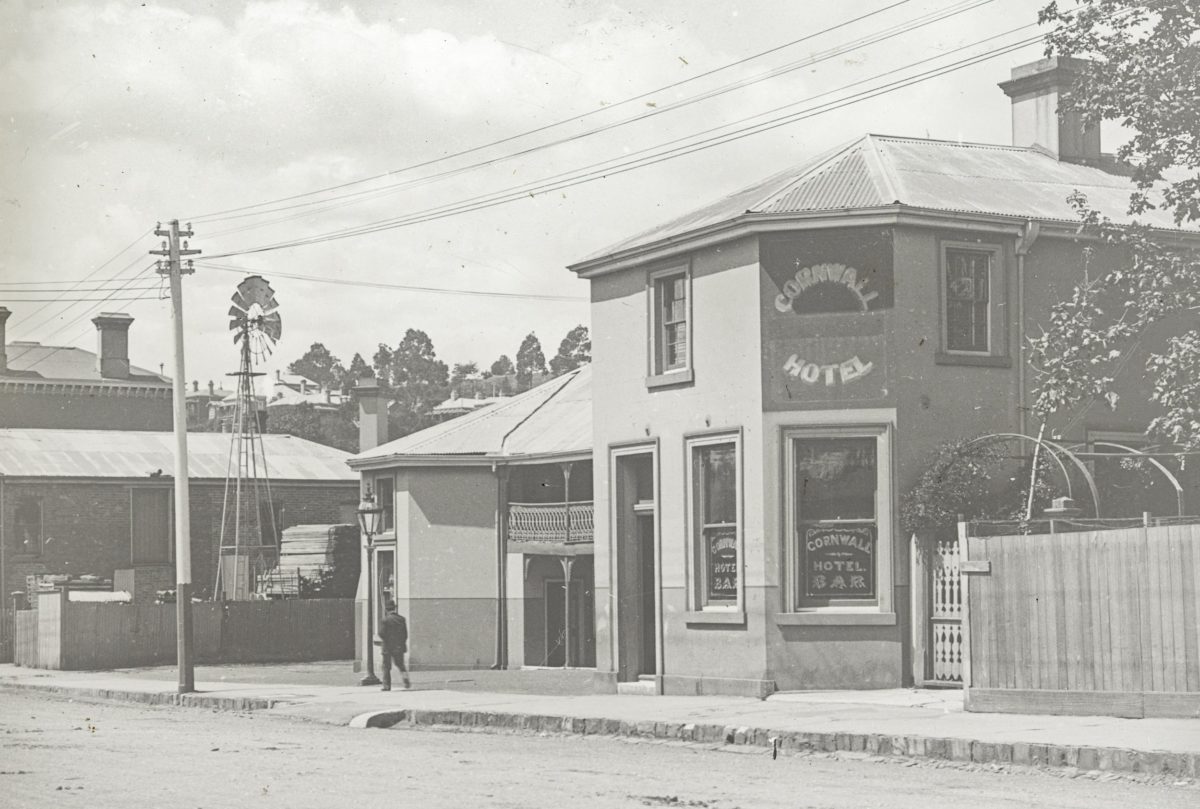
Cornwall Hotel (Cropped from photo at the Tasmanian Archives & Heritage Office).
THE OLD CORNWALL.
A FAMOUS HOSTELRY
POLITICAL HUSTINGS AND PREMIER ENTERTAINMENT HALL
Senator J. H. Keating informed the Licensing Bench yesterday morning that the proprietress of the Cornwall Hall, Mrs. Sarah Fahey had given instructions to Messrs. J. and T. Gunn to pull down the old building and replace it with an imposing edifice to cost £2500.
To old residents who remember the Cornwall Hotel in the late forties and early fifties this information will bring reflection. One gentleman, upon being asked for a few reminiscences by an ‘Examiner” man yesterday. sat back in his chair and said:–“Yes, I remember more than fifty years ago the Cornwall was a hotel of some consequence. Where Mr. Connolly’s office is now in George-street was, where the Hobart Town coach then started from. It was the office and the coach started from the corner of Cameron-street. It was in the Cornwall Hotel that the first meeting of the municipal council of Launceston was held. I. think that was in 1853, when the late Mr. William Stammers Button was Mayor. The Governors of the colony in those days put up at the Cornwall. I heard Sir William Denison address, the townspeople from the balcony, which was then a favourite place for politicians of all shades of opinions to voice their sentiments.
“At the time I speak of Mrs. Lukin was the licensee, and her son, Mr. Gresley Lukin, afterwards became one of the leading men of Queensland. It was there that the only large room available for public entertainments existed in the town. Indeed, there were two halls there, one downstairs and one upstairs, but the former was the more popular with company managers, and with the public.
“The first Christy Minstrels who ever came to Australia appeared there. And, oh! I must not forget to tell you that very far back I had the pleasure of hearing the greatest singer who has ever t visited Australia. I refer to Miss Catherine Hayes. The tariff for her concerts was £1 1s and 10.s 6d per ticket. My father paid 10s 6d for me to hear her. I was only a small boy then. but I have often thought since that .l have never heard her equal. I notice by recent references in the mainland newspapers that I am not the only one who thinks of her as the greatest singer that ever came to Australia. The Melbourne ‘Argus’ has said so, and I was glad to see it, because it confirmed me in my musical judgment. The hall was crowded on the night I heard her, and the passage way was lined with persons unable to gain an entrance. The high notes of her voice were heard by persons going home that evening up on the Windmill Hill. It was a marvellous voice. And yet Catherine Hayes was then an invalid. She came to Australia to try and strengthen her lungs, that were then in decline. and after her return to England she died of consumption. I have always been pleased to think my father spent that 10s 6d to enable me to hear that great singer.
“Lennox, the great conjuror, displayed his ability in the old Cornwall assembly rooms. There also the best of all the monologue entertainers made his bow to a Launceston audience. That was Farquharson. Black came here later on. and also practised his art in the same hall, but lie could not entertain like the former. Madame Carandini and her company sang there, so also did the Simonsens. About the best amateur minstrel society that was ever here performed there. Some of those who took part were Edward Brooks, Fred. Townley, R. Sage, W. Webster. and others whose names I cannot recall at the present moment.
“All the vice-regal balls were held in nit the assembly room. anti. indeed, all the chief public functions of that sort. It was here that the young people got their first dancing lessons under Professor Roberts. It was there I learnt to dance.
“Yes, the old house conjures up many he memories of the long ago, and they are for the most part pleasant ones.
“No, I cannot tell you when the Cornwall was built. I can remember it for more than 50 years, and it was then, I think, an old house. It had not very many landlords or landladies, because it was in the hands of some of them for a great number of years. It is one of the landmarks of the city, and one of the earliest, I should say.
“For a great many years all the horticultural shows were held there, and very successful ones they were in those days.”
Examiner, 7 February 1905
CITY IMPROVEMENTS
A MAGNIFICENT BUILDING. THE CORNWALL HOTEL.
Over eighty years ago— in 1824 — the name Cornwall Hotel was passing from lip to lip among a little crowd of early colonists, assembled within the hostelry on the day it opened as they drank success to the hotel, and prosperity to the proprietor, John Pascoe Fawkner. None of that jovial little band of well-wishers are not in the flesh, for all have crossed over and joined the great majority. The old hotel, however, bore up bravely against the ravages of time and decay, strengthened at intervals by renovations and additions, as age called for one and increased business for the other. The demands of the latter have of late been so persistent that the owner of the property, Mrs Fahey, decided to pull down the whole of the old buildings, and re-erect a model city hotel of the latest and most up to date style. In arriving at that decision Mrs Fahey did not do so without some pangs of regret, as in earlier days a number of the years of her life had been linked to the old place, as the hostess.
The old hotel could also lay claim to many historic associations. Within its walls the first Launceston newspaper was published on February 1, 1825, by its boniface, John Pascoe Fawkner, who afterwards became one of the founders of the City of Melbourne, and also started the first newspaper there. John Mitchell and Smith O’Brien, the Irish patriots of 1848, found shelter at the Cornwall, and the late Marquis of Salisbury, as plain Robert Cecil, put up there. The sympathetic voices of Catherine Hayes and Madame Anna Bishop warbling forth old Irish and English ballads, and the deep, rich bass of Farquharson in descriptive song, perchance ‘The Desert,’ have resounded through the old Assembly Hall in the days when those favorite artists were in their zenith, and at the time taking Launceston by storm.
The handsome building that has now been erected to replace the former one has quite obliterated the old landmark, leaving nothing to conjure up the days of long ago except the name — the Cornwall Hotel — that still exists, unaltered and unchanged. The present proprietor of the Cornwall, Mr W. B. Monks, who is a son-in-law of Mrs Fahey, the owner of the property, has furnished the hotel in a most- lavish and luxurious style omit ting nothing that would in any way be likely to enhance the comfort and pleasure of his patrons, and intends adding to these conveniences and surroundings day by day, as the necessity suggests itself.
It is hardly necessary to enter into a detailed description of this modern city hotel, but a short account, however, of the new building will no doubt interest our readers. The building which abuts on Cameron-street is elegant in design without being elaborate, and has an imposing appearance. The situation is central, and is admirably adapted either, for business people or pleasure seekers, being close to the wharves, trains, and Park, while rom the balcony a fine view is obtainable.
The entrance hall is wide and convenient for arriving and departing guests, and is provided with resting chairs, and large mirrors at the back brighten up the surroundings to an appreciable degree. On the left side is a very elegantly furnished room which is intended for the use of visitors as a ladies’ room. On the right is the smoking room, neatly furnished and admirably suitable for mining and commercial gentlemen, who may desire to talk over business matters when smoking the calumet of peace. Wide corridors branch off to right and left at the back of the hall, that on the left leading to the commercial room, sitting room, and parlor. The commercial room possesses all the necessary comfort and conveniences required ; the furnishing is elaborate, and includes a walnut and leather suite, overmantel, bookcase, writing table, desks, and other handy nic-nacs that tend to make a commercial man’s life a pleasure instead of a burden. The sitting room and parlor are also furnished with equal care and attention. The corridor on the right leads to the private bar, private parlor, billiard room, and dining room. The private bar is large and roomy, and well furnished, and adjoining it is the public bar, the entrance to which being from a side passage off Cameron-street gives entire privacy to the front of the hotel. The private parlor on this side of the house is quite in keeping with the others. The billiard room is large, lofty, and well lighted, nature supplying the light by day — the electric light shedding brilliancy around at night — the table is one of Alcock’s best.
The dining room is indeed spacious, and well worthy, of the name. Coolness and ventilation are. absolutely necessary, more especially in summer, in any room where meals are served, and in that direction Mr Monks has displayed great forethought in making ample provision. The room is almost square, measuring about 40ft x 40ft, and the ceiling must be fully 20ft from the floor ; windows and large ventilators are on each side, and a current of cool air is continually passing through ; small tables are set out on the floor, at which six can be seated, and these with a large centre table, will give comfortable seating accommodation for up to, 100. The kitchen, still room, and waiters’ pantry are on the same floor.
A wide stairway from the entrance hall leads to the first floor, on which are the drawing-room , single, and double bedrooms. The drawing room is a splendid apartment, with a large bay window, recess, and a door opening out on the balcony. The furniture is of exquisite and chaste design, the colorings are en suite, pale green predominating ; the suite of furniture is walnut, upholstered with plush, and silk tapestry, also piano, cabinet, pictures, mirrors, these, with the soft resistance underfoot of a velvet pile carpet, creating a feeling of luxurious indolence when entering this delightful room.
The group of double bedrooms on this floor are unique, each being distinctly different in the character of its furniture, the suites being in walnut, white oak, blackwood, olive green, and white enamel. These bedrooms are furnished with great taste, and it is easily perceptible that Mr Monks has spared no expense, as the costly furniture testifies. There are single rooms on the same floor, and these are also furnished with the same scrupulous attention to the comfort and requirements of visitors. On the second floor is another range of single bedrooms, which are also furnished with the same consistency and detail.
We have specially mentioned the excellent ventilation provided in the dining room, as it is so thorough and complete, but throughout every apartment in the hotel the same attention to ventilation has been observed. On each floor there are hot and cold baths,, lavatories, etc., and the sanitary arrangements are most complete, and in full accordance with the Health Act. The court-yard occupies a very large area at the back of the hotel, but ferneries, snuggeries, and other rustic devices will absorb some of that space.
The contractors for erecting the building were Messrs. J. and T. Gunn, and they have carried out the work with their usual care. Mr Monks believes in patronising local industry, and placed the order for furnishing throughout with Messrs. W. Coogan and Co. The high-class and artistic manner in which that firm has carried out Mr Monks’s instructions serves to indicate the extent and resources of that firm’s factory at Invermay. Mr Monks is a mining investor, well known both in Tasmania and on the mainland. His practical knowledge and sound judgment in mining matters have frequently induced capital to be spent in development and exploratory work on properties now giving good returns, and although he has taken the Cornwall he does not intend altogether losing touch with mining.
The Cornwall Hotel now stands in the front rank as one of the finest houses in the State, and should command the patronage of a very large proportion of tourists and the travelling public generally.
Daily Telegraph, 2 January 1906
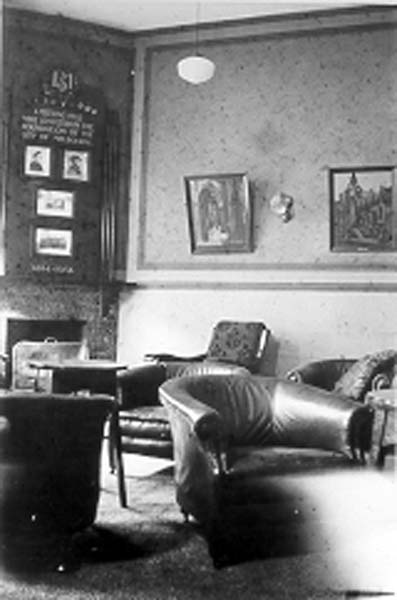
“Cornwall Hotel, Launceston – sitting room”, 1950 (from Tasmanian Archives & Heritage Office.)
